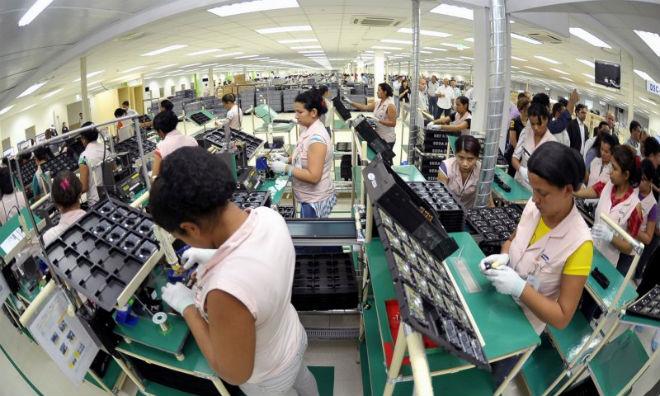Samsung accused of poisoning over 200 workers, then withholding information on toxins it exposed them to
One of Apple's largest component suppliers, Samsung Electronics, is the subject of a new investigative report regarding its withholding of critical information about the toxic chemicals its employees were exposed to while working in the company's factories.
Samsung's factory in Brazil hit with $108M suit over labor issues
According to a report by Youkyung Lee for the Associated Press, a worker safety group has documented over 200 cases of serious illnesses among former Samsung employees working in semiconductor and LCD factories.
Employees in their 20s and 30s have developed leukemia, lupus, lymphoma and multiple sclerosis, and at least 76 have died. However, the South Korean government has both made it difficult for poisoned workers to get any compensation related to occupational disease, and allowed Samsung to withhold from its employees any details about their exposure to toxic chemicals.
On 22 year old worker reported being offered 1 billion won ($864,000) to remain silent before she died of leukemia. Another, who lost her sight after being diagnosed with multiple sclerosis, reported that "there was never any education [at the factory] about what kind of chemicals could be bad so that we could be more careful."
A Samsung chip worker who developed breast cancer complained that Samsung "brought uninformed kids from the countryside and acted like money is everything, using them as if they were disposable cups."
Apple and Samsung
As Apple rose in stature as an international device manufacturer over the past decade, it began working to enforce standards among its suppliers, including Samsung, regarding the safely and treatment of workers and the handling of environmental toxins. Even so, media reports have regularly castigated Apple over employee suicides that occured among its contract manufacturers, while giving Samsung a pass for exposing its own workers to toxins.
In January 2013, after a hydrofluoric acid leak occurred in a Samsung plant resulting in the death of a worker, the local government initiated an investigation into the "coverup" of the incident after finding that the company didn't report the matter until ten hours had passed.
The incident was only reported as a curiosity among a few tech media blogs, even though the government eventually fined the company for its inaction. Lower margin Android products cut corners and take expedient shortcuts to deliver cheap products
That year, and every year since, tech media outlets have regularly suggested that there was no real difference between Apple's iPhone and the manufacturing of much lower margin Android products, which cut corners and take expedient shortcuts to deliver cheap products.
While reports of toxic exposures are swept under the rug by Samsung in South Korea, the manufacturing standards, worker welfare and toxic materials used by even lower-end Chinese manufacturers including Xioami, OPPO, Viva and Huawei are never even mentioned by Western journalists, despite a well known track record of Chinese companies cheating at benchmarks and environmental rules— including those reported as being caught and corrected by Apple's own Supplier Accountability standards.
Denials, deaths and apologies
Two years ago, Lee reported that more than 30 Samsung employees had filed active claims with South Korea's Workers' Compensation and Welfare Service, alleging a link between factory working conditions and rare forms of disease, cancer, multiple sclerosis and brain tumors, but few have seen their claims honored. At least another dozen have claims on appeal after having their cases rejected by the agency.
In December 2012, the agency ruled in favor of a 36 year old woman who died from breast cancer after working for years at a Samsung plant that exposed her to radiation, benzene and other carcinogens. Earlier that year, the agency also compensated a Samsung worker who developed aplastic anemia, and in 2011 Korean courts ruled in favor of two employees who linked their cancer to Samsung factories after the workers' comp agency rejected their claims.
In 2014, Samsung was accused of strong-arming Korean media to suppress coverage of the film "Another Promise," which depicted the struggle of Hwang Sang-ki, a father with a daughter who contracted leukemia at Samsung. The film portrayed events as occurring at a fictional company, albeit clearly modeled after Samsung.
Samsung denied trying to quash the film, and later offered apologies. The Wall Street Journal noted that a Seoul Administrative Court eventually ruled "that toxic chemicals at Samsung plants 'had caused or, at least, expedited the illness' of two workers, including Mr. Hwang's daughter" as portrayed in the film.
 Daniel Eran Dilger
Daniel Eran Dilger














 Amber Neely
Amber Neely
 Thomas Sibilly
Thomas Sibilly
 AppleInsider Staff
AppleInsider Staff
 William Gallagher
William Gallagher
 Malcolm Owen
Malcolm Owen
 Christine McKee
Christine McKee










62 Comments
Paid shills everywhere are freaking out.
ss and goog need to be cleared away.
Trump would tell them to 'just change careers, it's a free market baby'.
Why am I not the least bit surprised? I'm not even 1% surprised by this news. :#